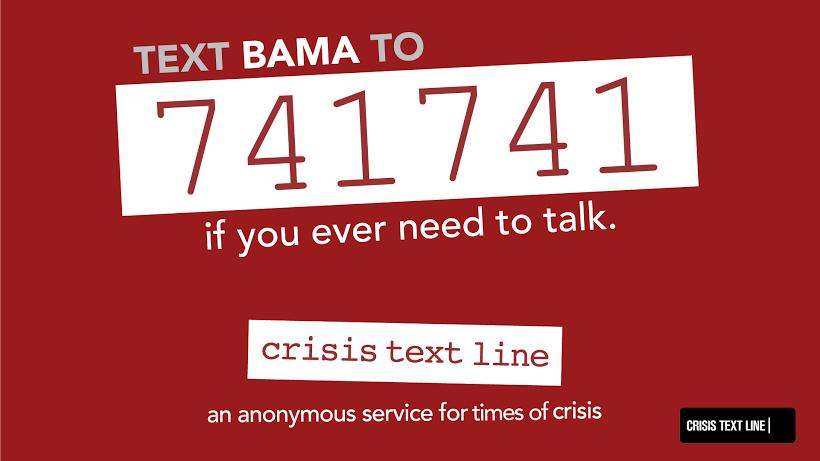Stress, relationship issues, anxiety, school problems – for college students, the list of struggles is endless. Even worse, busy schedules may not allow students adequate time to find help when they need it most.
Through a partnership with The University of Alabama’s Board of Trustees, the SGA has brought Crisis Text Line, a national hotline, to the University.
Students, faculty or anyone associated with the University can text “Bama” to 741741 in a time of crisis to receive help via text from the Crisis Text Line. The hotline operates 24/7 and volunteers talk to the texters about what they are struggling with.
Caroline Miller, a senior majoring in social work and political science, is a volunteer for the Crisis Text Line and helped bring it to the University through her position as an SGA senator.
Miller said the Crisis Text Line operates solely through text messaging, and volunteers with the hotline are the responders. She said the conversation and definition of a crisis is completely up to the texter.
“I think there’s a common misconception that someone has to be suicidal to use a hotline service,” Miller said. “Absolutely, the service can be utilized by those who may be having thoughts of suicide, but Crisis Text Line is designed to deal with any type of crisis situation.”
However, Miller said Crisis Text Line is not meant to work as a therapist. While the volunteers are trained in crisis counseling, their job is only to function as a friend to the texter, let them know that they are not alone. Within the conversations, the responder is likely to offer services outside of the Crisis Text Line to look into if they are interested.
“It’s important for us to point out that Crisis Text Line is really to serve as a bridge for students who are looking for more long-term solutions,” Miller said. “This service is really only one of the many resources that the University offers.”
Miller said the UA partnership with Crisis Text Line was launched on March 1 after students had expressed interest in having a crisis hotline available at all hours of the day.
Since it is still early in Crisis Text Line’s time at the University, data has not been collected concerning the reasons why students or faculty have texted the hotline. However, nationally-collected data and various crises details can be found at their website, here.
According to the Crisis Trends site, more than 14 million messages have been exchanged nationally since Aug. 1, 2013. The state of Alabama ranks in the top 10 for the number of users most affected by depression, family issues and health concerns, along with several other issues.
Miller said students can benefit from the Crisis Text Line on campus because it guides them through how they are feeling and functions as a support factor.
“It can be hard to reach out for help sometimes,” Miller said. “This really puts help at people’s fingertips. It makes it a lot easier for someone who may not be comfortable going straight to the Counseling Center or the Women and Gender Resource Center to talk about what’s been going on.”
Jordyn Kent, a sophomore majoring in public relations and political science, has learned about mental health issues and services through her personal life and time on campus. She considers mental health to be very important and actively works to maintain her mental health.
Kent said she learned about the Crisis Text Line through Facebook and believes it is a great idea as long as awareness about it is spread. She agreed with Miller that it will be effective for those who are not comfortable with seeking help in person.
“The hotline could be the first step [for someone] in establishing discussion about [their] mental health issues,” Kent said.









